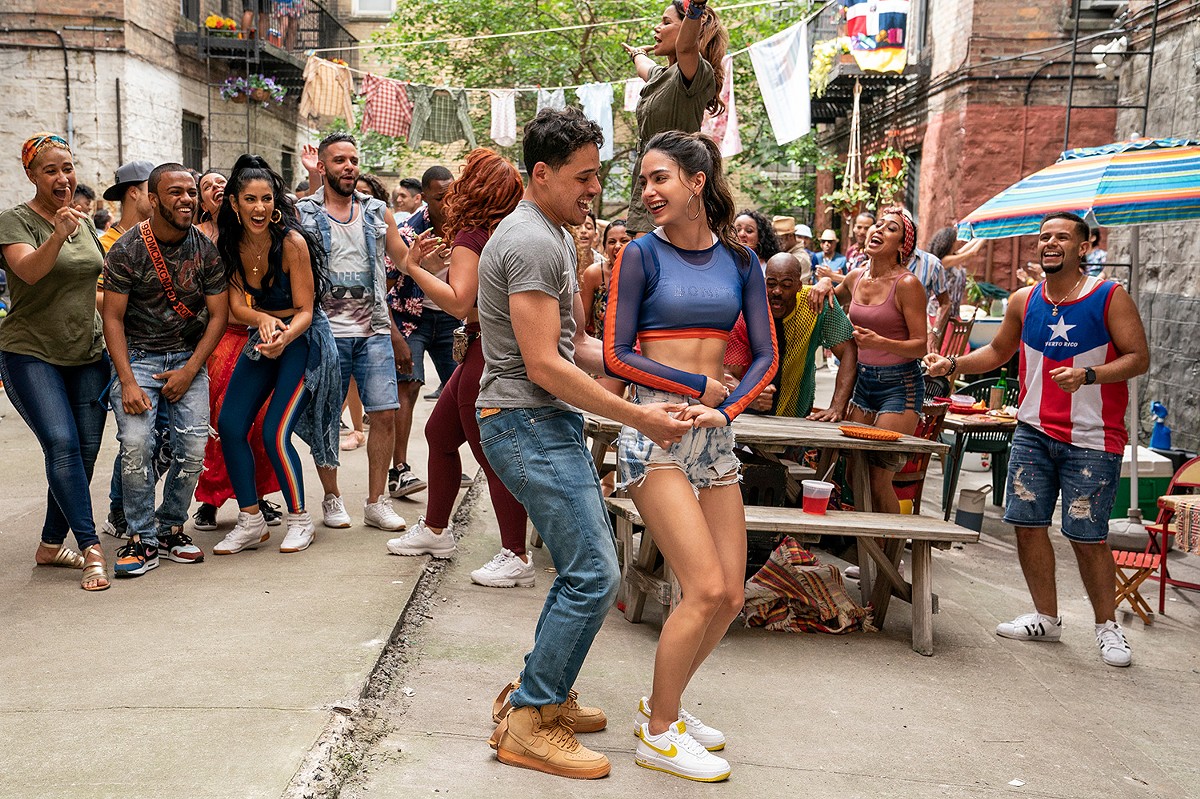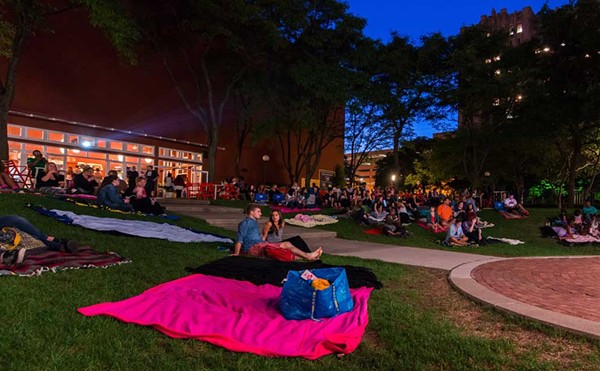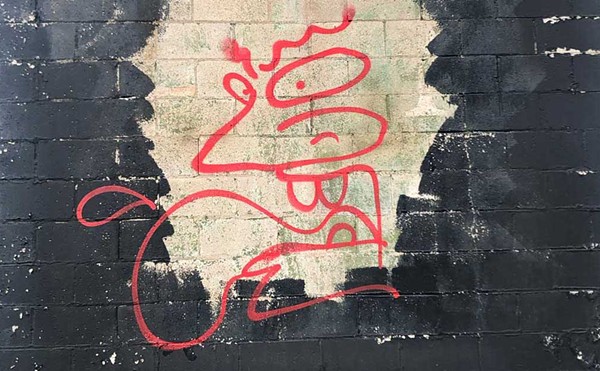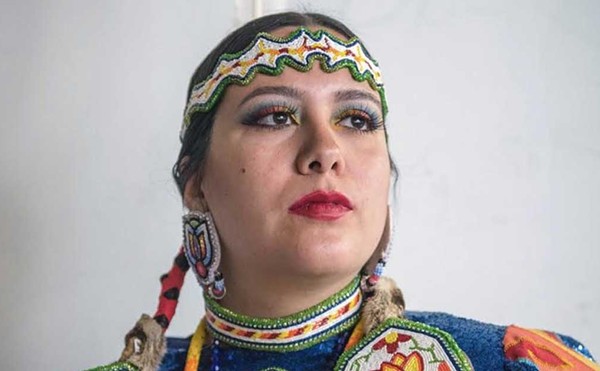Less a story than a toasty summer ode, In the Heights looks at Washington Heights, the largely Latinx New York barrio it makes its subject, with an affectionate, lingering gaze. With a script adapted from Lin-Manuel Miranda's 2008 stage musical by Quiara Alegría Hudes and direction by Jon M. Chu (Crazy Rich Asians), its attention to the local textures — bodegas, community pools, parks, and rooftops (often in the foreground of the George Washington Bridge) — feels divided. For Chu's compelled, by the nature of this adaptation, to aim for big numbers: splashy musical sequences he shrouds, like the rest of the film, in a convention-driven, escapist gloss familiar not just from prevailing modes of commercial filmmaking but those of commercials themselves.
For a film centered on a working-class neighborhood, In the Heights shows little interest in being grounded — and that's largely its point. Stubbornly buoyant even amid matters of race, class, immigration, and protest, the film's heart lies with its idealistic, wistful young protagonist, Usnavi (Anthony Ramos, also in the Broadway version of Hamilton). An orphaned bodega owner whose coffee fuels the neighborhood, Usnavi dreams of returning to the Dominican Republic to buy and restore his family's old beachfront bar, named Sueñito, or "Little Dream."
Along these lines, each character nurses some small ambition of their own, whether in vocation or in romance. The object of Usnavi's frail attempts at courtship, Vanessa (Melissa Barrera), wants to move downtown to become a fashion designer (apparently the subway won't do). Benny (Corey Hawkins), who works for a local cab company, wants nothing more than the affections of Nina (Leslie Grace), in whose dreams the film finds its most suggestive meanings.
As a kind of golden child not only of her family but for the community at large, Nina's torn between returning to complete her studies at Stanford, where she's been racially profiled, isolated, and repeatedly demeaned — and remaining in the neighborhood, disappointing those close to her but sparing her father years of financial burden. Finding a character caught between ambitions which aren't only hers but are held by a community for her and the more immediate gratifications of family, solidarity, and place, it's here that the film comes closest to sustaining actual tension. Her negotiation between these wants rests on shaky ground, however, dragged down by clumsy dialogue and insipid, Disney-fied ballads about whether she does or doesn't feel at home. All of this places her, regardless, on a kind of inverse trajectory to Usnavi, who's not yet achieved his longtime goals, and yearns mostly to leave.
The film's songs, unfurling in a more tuneful version of the steady vernacular Miranda gained fame for with Hamilton, mostly serve to underline these notions of community, belonging, aspiration, and home — and how they jar at times with personal ambitions. In these musical numbers lie Heights' signature formal gestures, which aim to do the same, though Chu's directorial hand in managing them proves far from sure. Aerial shots capturing vast crowds of singing actors choreographed in flash mob-like synchronous movement, surely meant to wow the viewer via the impressive scale of outdoor scenes (with echoes of La La Land's opening on a gridlocked highway), are cut rapidly with closer framings that all but charge toward actors' youthful, beaming faces as they belt out songs. Chu and cinematographer Alice Brooks seem to lack the confidence to hold a single frame long enough to really capture any given movement in its full execution. Whether editing to cover for errors or from the misguided belief that a musical's energy comes from anything so much as performance, this unsteady technique mars many of the Heights' best songs — worse still, in a soundtrack whose lyrics prove uneven to begin with, and whose rhythms often echo one another blithely. When the music works, it's when the camera lingers and lets the players' labor sing, making the most of the film's strong and sprawling chorus. In "Carnaval de Barrio," a modest but variegated dance number in a plaza between apartment buildings, Chu casually showcases most of his cast while the song's lyrics seem to tumble out across two languages with ease (though Spanish, strangely, seems under-represented) — lending the film its best and most uplifting song.
These actors have to contend, though, with a script and lyrics that are often boneheadedly literal, with music that often serves to narrate, without imagination, the action: "Look at the fireworks/ light up the night sky." This was less a problem in Hamilton — which was written later, with greater verbal acuity, and had much more ground to cover — but here, the metaphors repeatedly prove clumsy and strained. After a blackout that serves as an inflection point in the story (and after which the film gains some steam), characters repeat ad nauseam that they are "power-less," a political metaphor almost too corny to bear repeating. At the same time, the film's "dream/sueñito" rhetoric serves to underline the plight of Usnavi's cousin Sonny (a DACA recipient, or "Dreamer") in a turn that's a bit more graceful. Beyond its humane but barely-there political statements, the script's cornball air will likely strike viewers as either winning or ingratiating — for me it did a bit of both, largely thanks to the strength of the film's casting, which extends to its background actors — at least in terms of performance. As Usnavi, Anthony Ramos surpasses his peers by exhibiting a kind of naive charisma that frequently surpasses the energy of the film itself but proves welcome nonetheless.
Determinedly buoyant and seemingly well-intentioned, In the Heights at its fleeting best gets at the complex interplay of collective and personal aspiration in close-knit communities while working to represent a population all too often ignored both onscreen and off. While its production design, costuming, and performances are strong, its lack of a steady hand in scripting and direction deprives it of what it truly needs. Depictions and enactment of language and of romance lack both poetry and heat; meanwhile, its presentation of culture seems drained of much but surface textures. Lacking any consistent tension, felt history, or conflict, Heights nods to these things as though they're boxes to tick.
Like its characters, it comes off as largely single-minded — but never torn — in its ambitions, embodied here in a dogged, unabating eagerness to please.
Stay connected with Detroit Metro Times. Subscribe to our newsletters, and follow us on Google News, Apple News, Twitter, Facebook, Instagram, or Reddit.






